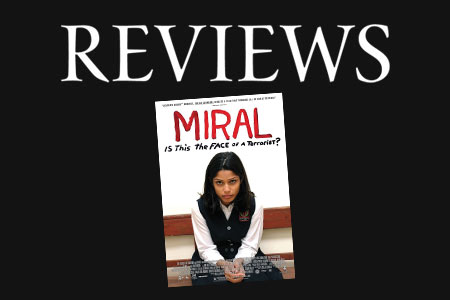
Miral
Issue 87 December 2011
While attending the Los Angeles premiere of Miral, I was struck by a moment of perspicuity. Here in the room, we are finally seeing more and more Arabs and Jews together sharing ideas and bringing about a social consciousness that has evaded the hoi polloi for quite some time. After a compendious introduction by the great Javier Bardem, the premiere began amongst actors, crew, journalists and noted individuals. While the tale has been met by mixed reviews, it is important to note that Julian Schnabel (the director) who is Jewish, and Rula Jabreal (writer of the screenplay and novel) who is Palestinian, started a romantic relationship as a result. Their courage is to be commended.
Miral is a story spanning over 60 years in the Israeli-Palestinian conflict; the story begins with Hind Husseini (played by Hiam Abbass) and her decision to open a school for children in Jerusalem in 1948 following the Deir Yassin massacre. After some years, Hind’s friend Jamal (Alexander Siddig) brings his daughter Miral to the school. She grows into a young woman (Freida Pinto), torn between the violent mindset of her political activist boyfriend (Omar Metwally) and the more peaceful path of academia. Two other storylines involve Nadia (Yasmine al Massri), Miral’s mother, and Fatima (Ruba Blal), a freedom fighter.
The film’s intent is to encourage a view of three sides of Palestinian women that has not been shown in any film in recent memory, and certainly not on an international level. Hind represents the love, understanding, and peaceful compromising solution; Fatima, the irascible response and feeling; and Nadia, the archetypal victim. Many complain that the film is one-sided, but the truth of the matter is it is a character study told from the perspective of our protagonists. Telling anything but their story would be an affront on the characters themselves.
The subject matter still received pre-release headlines as it saw the MPAA change its rating from R to PG-13, and the American Jewish Committee protesting at a New York premiere screening at the United Nations because they believe the film “portrays Israel in a highly negative light.” The screening at the United Nations was the first of its kind, and Schnabel had this to say: “I love the state of Israel. I believe in it, and my film is about preserving it, not hurting it. Understanding is part of the Jewish way, and Jewish people are supposed to be good listeners. But if we don’t listen to the other side, we can never have peace.”
This film is more about the situation as a whole and the dialogue that must begin in an earnest and important way. As Jews coming out of the Holocaust have said, “Never Again”, we should look at the plight that this film portrays and say “never again” to the injustices that play out today all over the world. We must evaluate our antediluvian ideas and shed our futilitarian mentalities to create a future that is indicative of a moral and just compass.
Bookmark this |
|
Add to DIGG |
|
Add to del.icio.us |
|
Stumble this |
|
Share on Facebook |
|
Share this |
|
Send to a Friend |
|
Link to this |
|
Printer Friendly |
|
Print in plain text |
|


Comments
0 Comments